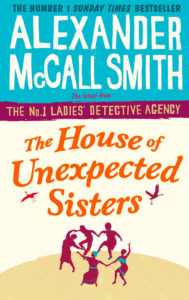“That’s the mystery series where no one dies, right?” said Kid One.
Yes it is, I said.
“Well how can there be danger?”
Ah, that’s the genius of this series, isn’t it? And oh, sweet youth, to think that death is the only kind of peril that’s strong enough to drive a story. Heartbreak, humiliation, loss of status, greed, or even seemingly less fraught things like misunderstandings and miscommunications — all of these can lead to situations that call for the skills of the No. 1 Ladies’ Detective Agency. Then there are happier motivations, like the one that prompts the main case in The House of Unexpected Sisters: the desire to correct an injustice.
Mr Polopetsi, the exceptionally mild-mannered chemistry teacher who sometimes assists at the agency, knows a woman, “Her name is Charity. She was married to a man called Mompoloki, but he is late now. He was always smoking, you see, right from the time he was ten years old, they told me, and now he is late. Late from smoking.” (p. 23) Immediately before this information about Charity and her late husband, Precious Ramotswe, the founder and owner of the Ladies’ Detective Agency had observed to herself that “There were odd side-roads in any conversation with Mr Polopetsi, and all that business about chemical symbols had been one such deviation. Once you got round all those, though, and were back on track in a conversation, he could explain things clearly enough.” (p. 22) The talk about smoking sends Mr Polopetsi off on another tangent, and it is a while before Mma Ramotswe can bring him back to the ostensible topic at hand. Not before a third sidetrack appears and shows something of both the characters speaking and the society in which they live:
“I was told there are two children,” said Mr Polopetsi. “I do not really know these people, and so there may be more, but I am told there are twins — both boys. They are still young. Maybe five or six — something like that.”
“It is a shame for them,” said Mma Ramotswe. “It is a shame for them to lose their daddy like that.”
Mr Polopetsi looked down at the floor. “There are many children like that, Mma. Remember?”
He did not have to explain further. There had been that disease and it had taken such a toll; mothers, fathers, uncles, aunts — the children had lost all these people, to such an extent that even the grandmothers, those resilient, uncomplaining women who could support the very sky on their shoulders, even they had buckled under the strain of looking after the children who were left behind. (p. 24)
Like many people opining on the troubles of others, Mma Ramotswe is also speaking about herself. Though she was a grown woman by the time her father died, she still feels his loss keenly, and thinks of him nearly every day.
Eventually, though, even Mr Polopetsi gets to the point:
“She had a job,” answered Mr Polopetsi. It was quite a good job, Mma. I say ‘was.’ She does not have that job any more, and that is why I am talking about her now.” (p. 24)
Charity’s job had been with a company that sells office furniture, and she had been fired for being rude to a customer. She says that she had not been rude, and at Mr Polopetsi’s prompting Mma Ramotswe and Mma Makutsi agree to try to find out what has happened. They do not hold out much hope, because even if the employer committed a wrong, the labor board is not always able to provide redress. On the other hand, the circumstances may be such that the employer can be persuaded to reverse the decision without outside intervention. If indeed a wrong has committed.
The situation is more complex because Mma Makutsi’s husband is also in the furniture line, although of a residential type rather than of an office type. Nevertheless, there could be questions of personal advantage; contrariwise, Mma Makutsi’s closeness to the subject matter might affect her judgement. Not least when it transpires that her nemesis, Violet Sephotho, might be involved.
And then there is the matter of the unexpected sister of the title. When she is introduced to Mma Ramotswe’s husband, she asks,
“What is his name, Mma?”
Mma Ramotswe replied automatically, “Mr J.L.B. Matekoni, Mma.”
Mingie looked puzzled. “Doesn’t he have …”
It was a perfectly reasonable question, but one that Mma Ramotswe did not answer. “He has always been called that, Mma — even by me. If we called him something different, he would be very confused.”
Mingie nodded. “We must not confuse men, Mma,” she said. (p. 161)
Indeed.

